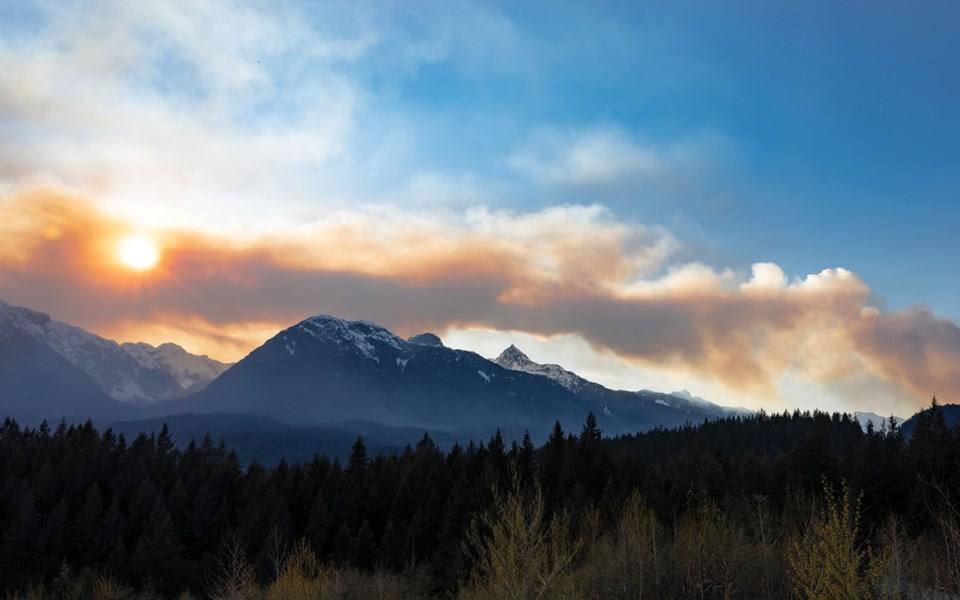Even with COVID-19 taking the bulk of the attention of local elected officials in recent weeks, other potential emergencies haven't been forgotten in the meantime.
"From the beginning, when the Whistler [Emergency Operations Centre] was activated, one of their early tasks was to advance a number of different dual-emergency scenarios, so the consideration of COVID-19 and wildfire, or the consideration of COVID-19 and a flood freshet," said Mayor Jack Crompton.
"The Province of B.C. has also directed all local governments to prepare for flood and wildfire emergencies during the COVID-19 pandemic. [So there is] significant planning across the province."
The EOC is regularly going through potential scenarios and sharing details with the provincial government, which then provides feedback, Crompton said.
An out-of-control wildfire in the Squamish Valley last week only served to heighten the urgency.
As of Wednesday, April 22, the fire was 203 hectares and classified as being held, with an evacuation alert still in effect for properties in the area.
"It's important to note that there's been extensive work done in recent years on wildfire, poor air quality and evacuation planning in Whistler, so we're well prepared for all of these areas," Crompton said.
"Now, we're primarily reviewing those plans through the COVID-19 lens."
It's hard for officials to accurately predict what a fire season might hold, said Dorthe Jakobsen, fire information officer with the BC Wildfire Service's Coastal Fire Centre.
"What we're hearing currently from our predictive services unit is that we're going to have a normal wildfire season, however, we did see an unseasonable dry April throughout southwest B.C., which did increase the fire danger ratings a little bit," Jakobsen said.
So far this year the Coastal Fire Centre has seen 16 fires burn a total of 235 hectares, compared to six burning 160 hectares at the same point last year (and a 10-year average of two).
"It's pretty normal for us to get a blip in April as the backyard burning starts up, and people start cleaning their yards and so on," Jakobsen said, adding that the public is reminded to report suspected wildfires immediately by calling 1-800-663-5555 or *5555 on a cell phone.
The potential for a dual emergency is not lost on Whistler Councillor Arthur De Jong, who oversees council's environment portfolio.
"It's been hard to sleep, in these times of a pandemic, when certainly as a councillor I worry about our community's physical and mental health, the survival of our local businesses, and now, likely, potentially, facing real extreme fire threats going into the heart of summer," De Jong said.
De Jong follows forecasts from the National Oceanic and Atmospheric Administration out of the U.S., which can be applied to B.C. and Whistler due to their proximity to the border.
"In their April, May, June forecast, they have about a 60-per-cent probability of less-than-seasonal average precipitation ... for temperatures, same range, 60 per cent higher-than-normal temperatures, through April, May and June," he said.
"So this start obviously puts us in a vulnerable situation going forward, unless we get a change in the weather pattern."
If wildfire protection took a back seat to COVID-19 in March, "it's in the front seat now, because of the dry conditions we have," De Jong added. "We're also very challenged, obviously, financially, but we cannot compromise public safety.
"So FireSmarting, fuel-reduction projects, in my view, we must continue on."
Whistler's 2020 budget earmarked $4.1 million over five years for community wildfire protection (to be used for fuel-thinning work) and $260,000 for trail and access road upgrades to maintain the ability to fight wildfire in urban interface zones next to Crown lands.
It remains to be seen how exactly COVID-19 will impact that budget.
"We'll be considering the budget this week, so no changes have been made yet," Crompton said. "I would say as it relates to wildfire prevention, plans are in place to continue to advance many of the activities within Whistler's wildfire protection area, including fuel thinning and FireSmart."
With so many self-isolating at home, now is a great time to FireSmart your property, Crompton added. Resources are available online at whistler.ca/firesmart.
"The best defense to manage a wildfire is early detection, so please keep your eyes peeled and report wildfires within Whistler to 911," he said.
"One of the challenges we face with fewer people in the community is that there are fewer eyes on the valley, so we count on our community to keep their eyes open."




